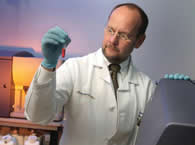News Release: Emory Healthcare, Research, School of Medicine, School of Nursing, School of Public Health, Winship Cancer Institute, Woodruff Health Sciences, Yerkes
Sep. 14, 2009
Emory External Research Funding Increases 18 Percent, Tops $484 Million

Emory University scientists received $484.2 million from external funding agencies in fiscal year 2009, an increase of 18 percent, or $73 million over fiscal year 2008.
More than 70 percent of the funds, or $343.6 million were awarded by federal agencies, with $298.5 million coming from the National Institutes of Health. NIH funding represented 61.6 percent of total funding and 86.8 percent of federal funding. The federal stimulus bill accounted for $13.8 million of FY09 funding.
Last year's (FY 2008) external research funding increased seven percent over the previous year, and until this year increases had averaged eight percent a year over a three-year period.
"The fact that our scientists continue to attract and substantially increase research funding awards at this level affirms both past accomplishment and potential for future success," says James W. Wagner, president of Emory University. "These funds are advancing all the missions of our university--teaching, research, and service--and we have great appreciation for our outstanding research faculty, staff, and students and their national and global leadership."Emory's Woodruff Health Sciences Center received more than $446.5 million, an increase of 15 percent over last year's funding, and 92 percent of the University total. The Health Sciences Center includes Emory University School of Medicine, Rollins School of Public Health, Nell Hodgson Woodruff School of Nursing and Yerkes National Primate Research Center.
Research funding to Emory University School of Medicine grew to $321.6 million, an increase of 14 percent over the previous year. Funding to Yerkes National Primate Research Center grew by 18 percent to $57.2 million, and funding to the Rollins School of Public Health grew by 12 percent to $60 million. Funding to Emory College faculty grew by 50 percent to $30.6 million.
"The continued growth of Emory research funding at a substantial pace, even within the current difficult financial conditions, reflects the excellence and hard work of our faculty throughout the University," says David L. Wynes, PhD, Emory vice president for research administration. "Our success also demonstrates an even greater commitment to developing worthy grant proposals and to conducting significant research that involves multiple Emory disciplines as well as external partnerships."
Examples of funded research include:
- $16 million over five years for a Human Immunology Center led by the Emory Vaccine Center and director Rafi Ahmed, PhD, a Georgia Research Alliance Eminent Scholar. Funded by the National Institute of Allergy and Infectious Diseases of the NIH, the center's goal is to improve the effectiveness of vaccines.
- $7.4 million for a five-year study of the connection between oxidative stress and colon cancer. Led by Paul Doetsch, PhD, in the Emory Winship Cancer Institute, the research is supported by the National Institute of Environmental Health Sciences of the NIH.
- $4.5 million to the Candler School of Theology from Lilly Endowment Inc. to continue building its doctoral program in religious practices and practical theology. The 10-year award from Lilly Endowment, Inc., follows a $10 million Endowment grant to Candler in 2002 that founded the program, which is changing and strengthening the training of a new generation of ministers and religious leaders.
- $28.5 million for the multi-year landmark National Children's Study, examining the impact of environmental and genetic factors on the health of U.S. children. A partnership with Morehouse School of Medicine, the University of Tennessee at Chattanooga College of Medicine, and Battelle Memorial Institute, the study is led by Carol Hogue, PhD, in the Rollins School of Public Health, and sponsored by the National Institute of Child Health and Human Development, the National Institute of Environmental Health Sciences, the Centers for Disease Control and Prevention, and the U.S. Environmental Protection Agency.
- $7.5 million over five years for the Emory Molecular and Translational Imaging Center, one of eight National Cancer Institute-funded centers studying cellular and molecular cancer imaging techniques. The multidisciplinary center is led by Carolyn Meltzer, MD, Mark Goodman, PhD, and Xiaoping Hu, PhD, a Georgia Research Alliance Eminent Scholar.
- $900,000 over three years to the Emory Graduate School to launch a masters program in development practice. The grant from the John D. and Catherine T. MacArthur Foundation is part of a significant, worldwide effort by the Foundation to promote more effective, sustainable development for the poorest of the poor. Only 10 institutions worldwide were awarded the grants.
- $6.4 million over five years to study the impact of environmental factors on Parkinson's disease and related disorders. Funded by the National institute of Environmental Health Sciences of the NIH, the grant is led by Gary Miller, PhD, in the Rollins School of Public Health, and will support research at Emory's Parkinson's Disease Collaborative Environmental Research Center.
- $14 million from the Bill & Melinda Gates Foundation to help reduce tobacco use in China. The Emory Global Health Institute and the Tobacco Technical Assistance Consortium (TTAC) of the Rollins School of Public Health have established the Emory Global Health Institute-China Tobacco Partnership.
- $550,000 over five years for a National Science Foundation CAREER development grant to organic chemist Simon Blakey, PhD, for his work to improve processes for both drug discovery and production, and for his commitment to interactive teaching methods.
###
The Robert W. Woodruff Health Sciences Center of Emory University is an academic health science and service center focused on missions of teaching, research, health care and public service. Its components include schools of medicine, nursing, and public health; Yerkes National Primate Research Center; the Emory Winship Cancer Institute; and Emory Healthcare, the largest, most comprehensive health system in Georgia. The Woodruff Health Sciences Center has a $2.3 billion budget, 17,000 employees, 2,300 full-time and 1,900 affiliated faculty, 4,300 students and trainees, and a $4.9 billion economic impact on metro Atlanta.
Learn more about Emory’s health sciences:
Blog: http://emoryhealthblog.com
Twitter: @emoryhealthsci
Web: http://emoryhealthsciences.org
